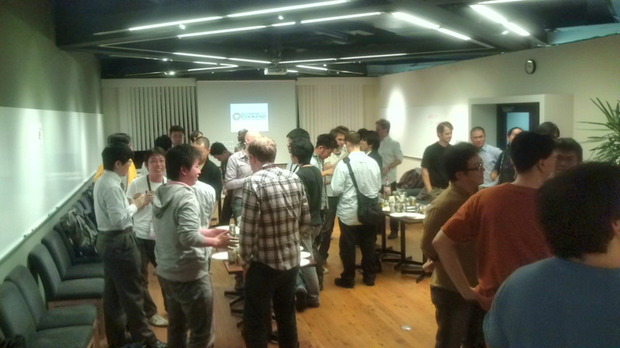Tokyo Rubyist Meetup

Paul McMahon

Last night’s Tokyo Rubyist Meetup had over forty guests, about half of which were Japanese. I was happy to see that Japanese and non-Japanese alike mixed with each other, and I think pretty much everyone had a good time.
The event was hosted by Cookpad, who run Japan’s largest Ruby on Rails site and is looking for developers. The company has the nicest office of any Japanese company I’ve ever been to, and if I was looking for a job, I’d certainly consider applying there.
This time, I asked Akira Matsuda to give an encore of his presentation Ruby in the World, and Rails in Japan that he presented at Ruby World Conference 2010, as the theme matched that of Tokyo Rubyist Meetup. In his presentation, he talked about Japanese rubyists being too reliant on translations of Rails material. The problem with translations, he said, was that there is a great delay between when the original material is released, and when the translation is finished. As an example, the book Head First Rails, which he translated, was finally released two years after the original edition. Furthermore, translation is a one way street, and rubyists reliant on translated materials cannot engage the original author.
At the end of his presentation, Akira asked the audience what we can do to close the gap in communication between Japanese and non-Japanese rubyists. One suggestion was to get rid of the two core mailing lists, and allow both Japanese and English communication to continue on a single list. Another was that when responding to change requests that have already been disscused in Japanese, the previous conversation should be linked to, so that non-Japanese rubyists have a place to start (for instance, using machine translation).
Unfortunately, the conversation after Akira’s presentation was dominated by non-Japanese. I can certainly understand not wanting to participate in a group discussion in a language you aren’t comfortable speaking - I have that problem with Japanese. However, as the rest of the night had a lot of participation from both sides, this one hiccup was pretty minor.
After the meetup, I went out for a nijikai with about ten other rubyists. I managed to make my last train, but I think the rest of them weren’t able too. I didn’t want to go back home, but as I had a morning meeting, staying out all night seemed like not the best thing to do.
I had a great time meeting up with all my fellow rubyists here in Tokyo, and am eagerly awaiting the next event.